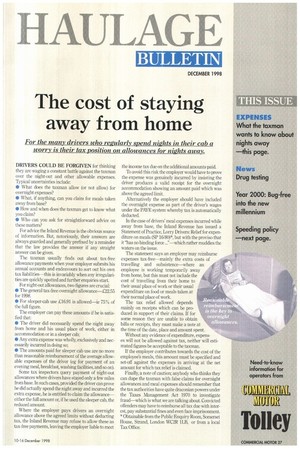HAULAGE
Page 29

If you've noticed an error in this article please click here to report it so we can fix it.
DECEMBER 1998
The cost of staying away from home
For the many drivers who regularly spend nights in their cab a worry is their tax position on allowances for nights away.
DRIVERS COULD BE FORGIVEN for thinking they are waging a constant battle against the taxman over the night-out and other allowable expenses. Typical uncertainties include: • What does the taxman allow (or not allow) for overnight expenses?
• What, if anything, can you claim for meals taken away from base?
• How and when does the taxman get to know what you claim?
• Who can you ask for straightforward advice on these matters?
For advice the Inland Revenue is the obvious source of information. But, notoriously, their answers are always guarded and generally prefixed by a reminder that the law provides the answer if any straight answer can be given.
The taxman usually finds out about tax-free allowance payments when your employer submits his annual accounts and endeavours to sort out his own tax liabilities—this is invariably when any irregularities are quickly spotted and further enquiries start For night-out allowances, two figures are crucial: • The general tax-free overnight allowance—.C22.55 for 1998.
• For sleeper-cab use £16.91 is allowed—ie 75% of the full figure.
The employer can pay these amounts if he is satisfied that: • The driver did necessarily spend the night away from home and his usual place of work, either in accommodation or in a sleeper cab; • Any extra expense was wholly, exclusively and necessarily incurred in doing so; • The amounts paid for sleeper cab use are no more than reasonable reimbursement of the average allowable expenses of the driver (eg for payment of an evening meal, breakfast, washing facilities, and so on).
Some tax inspectors query payment of night-out allowances where drivers have stayed only a few miles from base. In such cases, provided the driver can prove he did actually spend the night away and incurred the extra expense, he is entitled to claim the allowance— either the full amount or, if he used the sleeper cab, the reduced amount.
Where the employer pays drivers an overnight allowance above the agreed limits without deducting tax, the Inland Revenue may refuse to allow these as tax-free payments, leaving the employer liable to meet the income tax due on the additional amounts paid.
To avoid this risk the employer would have to prove the expense was genuinely incurred by insisting the driver produces a valid receipt for the overnight accommodation showing an amount paid which was above the agreed limit Alternatively the employer should have included the overnight expense as part of the driver's wages under the PAYE system whereby tax is automatically deducted.
In the case of drivers' meal expenses incurred while away from base, the Inland Revenue has issued a Statement of Practice, Lorry Drivers: Relief for expenditure on meals (SP 16/80)*, but with the proviso that it "has no binding force ..."—which rather muddies the waters on the issue.
The statement says an employer may reimburse
expenses tax-free—mainly the extra costs of fig. travelling and subsistence—where an employee is working temporarily away from home, but this must not include the cost of travelling from their home to their usual place of work or their usual expenditure on food or meals taken at their normal place of work.
The tax relief allowed depends mainly on receipts which can be produced in support of their claims. If for some reason they are unable to obtain bills or receipts, they must make a note at the time of the date, place and amount spent Without any evidence of expenditure, expenses will not be allowed against tax, neither will estimated figures be acceptable to the taxman.
Tithe employer contributes towards the cost of the employee's meals, this amount must be specified and set-off against the expenses in arriving at the net amount for which tax relief is claimed.
Finally, a note of caution; anybody who thinks they can dupe the taxman with false claims for overnight allowances and meal expenses should remember that the tax authorities have quite draconian powers under the Taxes Management Act 1970 to investigate fraud—which is what we are talking about. Convicted offenders may have to reimburse all tax due with interest, pay substantial fines and even face imprisonment. *Obtainable from the Public Enquiry Room, Somerset House, Strand, London WC2R 1LB, or from a local Tax Office.
Reasonable reimbursew is the key to overnight allowances.












































































































